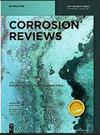镁合金在乙二醇水溶液中的腐蚀与缓蚀行为研究进展
IF 3.2
4区 材料科学
Q3 ELECTROCHEMISTRY
引用次数: 0
摘要
摘要镁合金是目前最具发展前景的汽车轻量化材料之一,但其较差的耐腐蚀性严重阻碍了其在汽车发动机上的实际应用。缓蚀剂技术具有用量小、操作简单、成本低、不影响金属散热等特点。因此,在汽车发动机冷却液中加入高效长效缓蚀剂是实现镁合金在汽车发动机上应用的最简单、最实用、最有效的途径。本文综述了镁合金在乙二醇水溶液中的腐蚀和缓蚀行为。综述了温度、电效应、水含量、阴离子氧化物和酸性氧化物对汽车冷却液中镁合金腐蚀的影响。综述了无机缓蚀剂、有机小分子缓蚀剂、聚合物缓蚀剂和复合缓蚀剂在乙二醇水溶液中抑制镁合金腐蚀的研究进展及优缺点。为实现镁合金在发动机上的应用,提出了无机高分子缓蚀剂复合膜的构建,进一步丰富了镁合金的腐蚀理论和防腐技术。本文章由计算机程序翻译,如有差异,请以英文原文为准。
A review on corrosion and corrosion inhibition behaviors of magnesium alloy in ethylene glycol aqueous solution
Abstract Magnesium alloy is one of the most promising automotive lightweight materials, but its poor corrosion resistance seriously hinders its practical application in automotive engines. Corrosion inhibitor technology has the characteristics of small dosage, simple operation, low cost, and does not affect the heat dissipation of metals. Therefore, adding high-efficiency long-term corrosion inhibitors to automotive engine coolants is the simplest, most practical and effective way to realize the application of magnesium alloy in automotive engines. This paper reviewed the corrosion and corrosion inhibition behaviors of magnesium alloy in ethylene glycol aqueous solution. The effects of temperature, galvanic effect, water content, and anionic and acidic oxides on the corrosion of magnesium alloy in automotive coolant were summarized. The research, advantages and disadvantages of inorganic, organics small-molecule, polymer, and composite corrosion inhibitors for inhibiting the corrosion of magnesium alloy in ethylene glycol aqueous solution were also summarized. The construction of inorganic-polymer corrosion inhibitor composite films was proposed to realize the application of magnesium alloy in engine, which further enriched the corrosion theories and anti-corrosion technologies of magnesium alloy.
求助全文
通过发布文献求助,成功后即可免费获取论文全文。
去求助
来源期刊

Corrosion Reviews
工程技术-材料科学:膜
CiteScore
5.20
自引率
3.10%
发文量
44
审稿时长
4.5 months
期刊介绍:
Corrosion Reviews is an international bimonthly journal devoted to critical reviews and, to a lesser extent, outstanding original articles that are key to advancing the understanding and application of corrosion science and engineering in the service of society. Papers may be of a theoretical, experimental or practical nature, provided that they make a significant contribution to knowledge in the field.
 求助内容:
求助内容: 应助结果提醒方式:
应助结果提醒方式:


